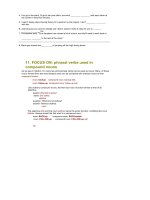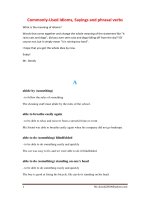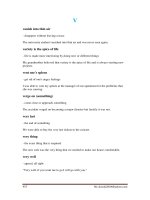phrasal verbs used in compound nouns
Bạn đang xem bản rút gọn của tài liệu. Xem và tải ngay bản đầy đủ của tài liệu tại đây (84.69 KB, 13 trang )
4. You go to the bank, I'll go to the post office, and we'll ________ ________ with each other at
the corner in forty-five minutes.
5. I wasn't happy about having Nancy for a partner on the project. I don't ________ ________
with her.
6. Just because you went to college and I didn't, doesn't make it okay for you to _______
________________me.
7. The teacher said, "Your daughter has missed a lot of school, and she'll need to work hard to
________ ________ to the rest of the class."
8. Maria got scared and__________of jumping off the high diving board.
11. FOCUS ON: phrasal verbs used in
compound nouns
As we saw in Section 10, many two-word phrasal verbs can be used as nouns. Many. of these
nouns formed from two-word phrasal verbs can be combined with ordinary nouns to form
compound nouns:
noun: backup compound noun: backup disk
noun: follow-up compound noun: follow-up call
Like ordinary compound nouns, the first noun has a function similar to that of an
adjective:
question: What kind of clothes?
answer: Dirty clothes.
adjective
question: What kind of clothes?
answer: Workout clothes.
noun
The adjective dirty and the noun workout serve the same function: modifying the noun
clothes. Always accent the first word in a compound noun:
noun: BACKup compound noun: BACKupdisk
noun: FOLLOW-up compound noun: FOLLOW-up call
70
Infinitive
present tense -ing form past tense past participle
backup
back u
p & backs up backing up backed up backed up
1. back... up p.v. When you walk backward, you backup. When you drive a vehicle in
reverse, you back up or back the vehicle up.
The fire was so hot that we had to back up.
I put the car in reverse and backed it up.
2. back up p.v. When you are explaining something, and you repeat something that you
already said, you back up.
You're going too fast. Can you back up a little and explain your plan again?
Sorry, I forgot part of the story. Let me back up a little.
3. back... up p.v. When you make a claim or statement and then show people evidence
or give them information proving that the claim or statement is true or correct, you back it
up.
No one believed Jim's accusations because he couldn't back them up with any evidence.
The IRS asked me for some receipts to back up my deductions.
4. back... up p.v. When you support people in a conflict or a confrontation, you back
them up. When you support people by doing some work or a difficult assignment,
you back them up.
Linda said she would back me up if I complained about our supervisor.
The general backed up his threats with 400,000 soldiers.
Jerry is the bar's main bartender, and Tanya backs him up when it gets busy.
backup n. Someone or something that supports or is ready to provide support in a conflict
or a confrontation by doing some work or a difficult assignment is a backup.
When the rioters grew more violent, the police called for backup.
The firefighter entered the burning building without a backup.
5. back... up p.v. When you duplicate important information, such as a computer program
or data, so that you will still have it if the original information is lost or damaged, you back
it up.
If you're going to install that new software, be sure you back up your entire hard disk first.
I back my work up every day before I go home.
backup n. A duplicate of important information, such as a computer program or data, is a
backup.
/ keep a backup of my important computer files on floppy disks.
The major gave a backup copy of the battle plan to his secretary.
71
backed up part.adj. After you duplicate important information/such as a computer
program or data, the original is backed up.
/ accidentally erased your book from your computer. I hope your work was backed up.
6. back... up p.v. When a piece of equipment or machinery is very important and another
is kept available in case the one that is normally used fails, the second piece of
equipment or machinery backs up the first.
The hospital bought a generator to back up the unreliable city power supply. We kept the old
computer to back the new one up.
backup n. When a piece of equipment or machinery is very important and another is kept
available in case the one that is normally used fails, the second piece of equipment or
machinery is a backup.
The skydiver checked his main parachute and his backup before the flight. The school
had to dose when the main power and the backup both failed.
7. back... up p.v. When something backs up, it is being prevented from moving,
progressing, or flowing normally.
An accident backed up traffic for three miles. The assembly line is going to back up if Erik doesn't get
the parts he needs soon.
backup n. A backup is a situation in which something is being prevented from
moving, progressing, or flowing normally.
/ sat in that backup for three hours without moving an inch. The huge number of Christmas
cards and packages caused a backup at the post office.
backed up part.adj. When something is being prevented from moving, progressing, or
flowing normally, it is backed up.
Let's take the train downtown. Traffic is always backed up at this time of the morn in a.
Infinitive
present tense -ing form past tense past participle
cut off
cut off & cuts off cutting off cut off cut off
1. cut... off p.v. When you completely remove part of something with a knife, saw, or pair
of scissors, you cut it off.
He cut off a piece of cheese so that I could taste it. One of the
kings of England had his head cut off.
2. cut... off p.v. When you stop the supply or flow of something, such as water,
electricity, or money, you cut it off or you cut off the people receiving it.
/ won't be surprised if my electricity is cut off— I haven't paid the bill in three months.
The bartender told the drunk guy that she was cutting him off.
72
cutoff n. The time when something, such as water, electricity, or money, is cut off is the
cutoff, cutoff point, or cutoff date.
/ got a notice saying that if I don't pay my water bill soon, the cutoff date will be March 10. Ninety is the cutoff—
students with lower scores on the exam won't be accepted into the advanced program.
3. cut... off p.v. When you abruptly and rudely drive a vehicle in front of other people's
vehicles, causing them to suddenly slow down or stop, you cut them off.
/ had to slam on the brakes when some jerk cut me off on the way to work. The lady in the red car tried to
cut me off, but I wouldn't let her get in front of me.
4. cut... off p.v. When someone is cut off while speaking on the telephone, the con-
nection is accidentally broken.
/ was in the middle of an important call when I was cut off. Getting cut off happens all the
time when you're on the phone to China.
5. cut ...off p.v. When you create a physical or psychological barrier between yourself
and other people, you cut yourself off from them. When you are separated from other
people because of a barrier or a great distance, you are cut off from them.
After Dan joined a cult, he completely cut himself off from his family and friends. A flash flood cut us
off from the rest of the expedition.
cutoff part.adj. When you are separated from other people because of a barrier or a great
distance, you are cutoff.
The bridge was destroyed by the earthquake, and now we're cut off.
Infinitive
present tense -ing form past tense past participle
drop off
dro
p off & drops off dropping off dropped off dropped off
1. drop... off p.v. When you take things or people to another place and leave them there,
you drop them off.
Can you drop me off at the train station on your way to work? Luis dropped off
his laundry at the cleaners.
drop-off n. Something that has been dropped off is a drop-off. The place where
something or someone is dropped off is a drop-off point, drop off window, and soon.
Luis left his laundry at the drop-off window. The north side of the train station
parking lot is for drop-offs.
2. drop off p.v. When a business's sales, the occurrence of some event, or the interest
some people have in something declines, it drops off.
Attendance at baseball games has been dropping off in the last few years. After CDs were introduced, sales of
records dropped off sharply.
73
drop-off n. A decline in a business's sales, in the occurrence of an event, or in the interest
some people have in something, is a drop-off.
There has been a drop-off in traffic deaths thanks to strict drunk driving laws. The drop-off in car sales
was explained by the recession.
3. drop off p.v. When the level of the ground declines steeply, it drops off.
Be careful hiking this trail, it drops off steeply on the other side of the mountain. The island has no beach
at all. The land drops off straight into the sea.
drop-off n. A steep decline in the level of the ground is a drop-off.
The bus driver didn't see the drop-off, and the bus plunged into the gorge. It was hard to see
the drop-off because of the dense jungle.
Infinitive
present tense -ing form past tense past participle
follow up
follow u
p & follows up following up followed up followed up
1. follow up (on) p.v. When you follow up on something, you return to something that was
important to you previously because you now have more information or more time or
because you want to make sure some effort you made previously is correct or effective.
/ saw a beautiful house with a "for sale" sign and I followed up on it when I got home. The doctor told me
I'd need to follow up the treatment with physical therapy.
follow-up n. A follow-up, follow-up call, follow-up visit, and so on, is a return to
something that was important to you previously because you now have more information or
more time or because you want to make sure some effort you made previously is correct or
effective.
The customer service manager made a follow-up call to make sure I was happy with the repair job. The doctor
asked me to see him two months after the operation for a follow-up.
take out
take out & takes out takin
g out took out taken out
1. take ... out (of) p.v. When you take something out or take it out of a container, storage
place, or building, you remove it. Put in/into is the opposite of take out.
/ want to take some books out of the library tonight. Jake took out
a gun and shouted, "This is a holdup!" Nancy took $500 out of the
bank.
takeout n. Takeout is food that is taken from a restaurant to be eaten at another location.
Carryout and carry-out food are the same as takeout and take-out food.
/ don't feel like cooking tonight. Let's get takeout. That take-out
chicken is good, but it sure is greasy.
74









